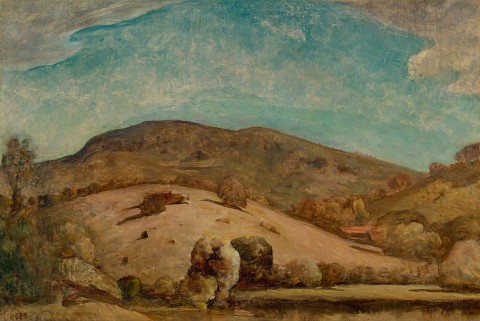SPRING AFTERNOON, WERRI BEACH, c.1948
LLOYD REES
oil on canvas on board
30.0 x 44.0 cm
signed lower left: L REES
bears inscription verso: SPRING AFTERNOON WERRI / BEACH LLOYD REES
Possibly: Macquarie Galleries, Sydney
Private collection
Sotheby’s, Melbourne, 30 April 2002, lot 6
The Cbus Collection of Australian Art, Melbourne, acquired from the above
Possibly: 1948 Northwood Group Show, Macquarie Galleries, Sydney, 5 – 17 May 1948, cat. 16 (as ‘Afternoon Light’)
Dawn to Dusk: Landscapes from the Cbus collection of Australian Art, Latrobe Regional Gallery, Victoria, 31 May – 16 November 2014
Morning, Noon and Night, Latrobe Regional Gallery, Victoria, 13 July – 13 October 2019
on long term loan to Wollongong City Gallery, New South Wales
Possibly: Free, R., Lloyd Rees, Lansdowne Press, Melbourne, 1972, cat. O112 (as ‘Afternoon Light’, in the collection of Mr and Mrs A. P. Henchman)
Nainby, B., Stanhope, Z., and Furlonger, K., The Cbus Collection of Australian Art, in association with Latrobe Regional Gallery, Melbourne, 2009, pp. 74 (illus.), 231
Lloyd Rees’ reputation as a consummate draughtsman overshadowed his subtle and steady work as painter from the 1920s. But from the mid-1940s his paintings were met with fulsome accolades. This was the decade when he secured a reputation with work borne out of painting en plein air and a deep understanding of art history.
Spring afternoon, Werri Beach, c.1948 was painted not long after Lloyd Rees painted his celebrated Road to Berry, 1947 (Art Gallery of New South Wales).1 Both works are relatively small but they belong to a period when his classically modern landscapes attracted the admiration of artists, critical opinion, public galleries and serious collectors alike.
The wellspring for Rees’ art was drawing which began as a student at the Brisbane Technical College in 1910. The ink drawings of Brisbane, especially its architecture, have the character of old master grandeur – light and dark shadows which romantically elevate his keen observation of local subjects. In 1917, he was in Sydney and the formative heady days of modernism where he formed friendships with some of the leading exponents. And by 1923, Rees was travelling to Europe where he was drawn to the work of Jean-Baptiste-Camille Corot, J.M.W. Turner, Titian and Claude Lorrain amongst many, although plein-airism and Italian classicism clearly had the most enduring effect.
John Olsen was effusive in recalling Rees’ landscapes, while the sweeps, curves and volumes remained with Brett Whiteley’s visual imagination throughout his career – and indeed, during the mid-80s he made a pen and brush ink drawing as a tribute to Road to Berry.2 Unsurprisingly Whiteley extended Rees’ observation that, ‘subconsciously I’ve felt the hills have made me think of the feminine form – rhythm associated with figure and landscape.’3 Spring Afternoon, Werri Beach retains the voluminous characteristics of Road to Berry but with an indebted nod to Corot and Italian classicism.
Rees wasn’t interested in the outback or colloquial landscapes of any ‘type’ of pictorial Australianness. Rather his paintings have a serenity, a knowingness and affection for various locations within easy reach, from two hours south of Sydney and Kiama, Berry, Werri and Gerringong or northwest and inland to Orange and Bathurst. He admired French Barbizon School painting where a particular location might offer perpetual inspiration. Spring Afternoon, Werri Beach reminds us that scale and significance are never mutually exclusive from each other.
1. Road to Berry, 1947, oil on canvas on paperboard (Art Gallery New South Wales)
2. Brett Whiteley, Lloyd Rees: 'The road to Berry' 1985, pen and black ink, brush and black ink, wash, gouache on cream laid paper (Art Gallery New South Wales)
3. Rees, cited in Free, R., Lloyd Rees, Lansdowne Australian Art Library, Melbourne, 1972, p. 51
DOUG HALL AM
